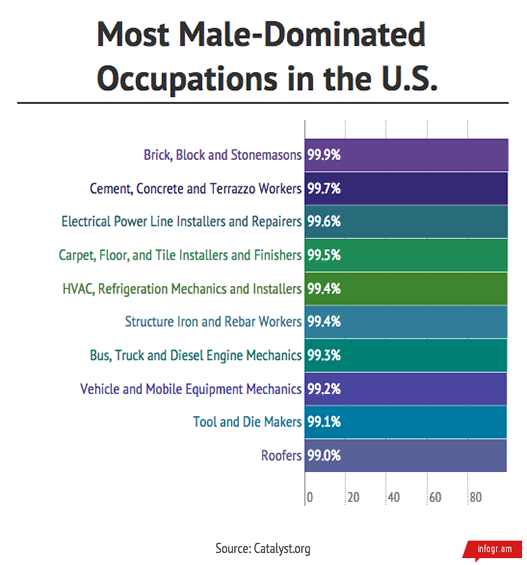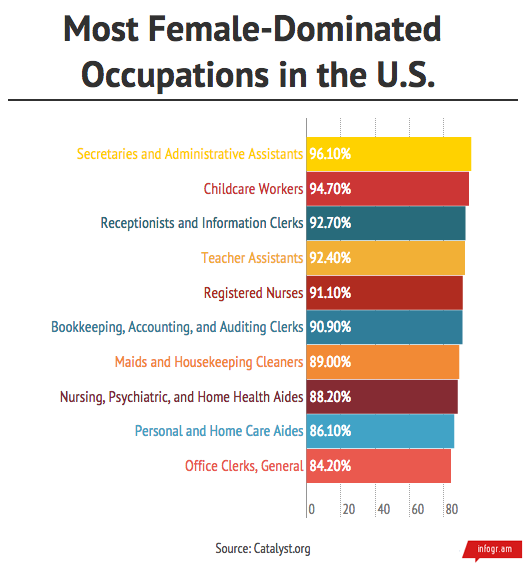Women have made great strides in the workplace since the sixties, but we are still making 78 cents for each dollar a man earns, and there's still a discrepancy in what's considered "women's work" and what's deemed a "man's job." The most common occupation for women today is still the same as it was 50 years ago: secretary. In the upcoming documentary, Hard Hatted Woman, filmmaker Lorien Barlow explores gender stereotypes entrenched in the workforce by shining a spotlight on an industry that has remained stubbornly male even despite federal interventions in the late '70s: construction -- where less than 3% of workers are women.
Barlow began developing the project in the fall of 2012, and since then, she has interviewed dozens of tradeswomen from all over the country. Not wanting to go into construction work, she discovered, isn't the sole reason why women are barely present in the sector. "Somewhere along the way, these women are leaving the trades in significant numbers," she said. "From all my research over the past two years, it seems the culture of construction is the hardest thing to endure, not the work itself."
"The isolation can be very unsettling. Imagine being the only woman on the job. Imagine never seeing anyone else like you. You're singled out, everyone notices you... And construction workers move from jobsite to jobsite, and at each one they have a new foreman, new crew, a new social environment to navigate. It's a repetitive stress."
- Lorien Barlow, producer and director of Hard Hatted Woman
Amy James Neel, job developer at Oregon Tradeswomen, Inc., says female workers are not taken seriously, and therefore have a hard time getting the training and skills they will need to advance: "So many of our apprentices go out into the field, and they're pushing a broom. After three years, they're still pushing a broom." One female apprentice described to the filmmaker her experience working in construction as "death by a thousand cuts," referring to the assumptions that women confront daily -- assumptions that deny female workers the opportunities to prove they can do the job; and a carpenter told Barlow working in construction as a woman is like working two full-time jobs: "Your first job is being a worker. Your second job is dealing with the emotional challenges of being a woman in this work."
Among the personal and political barriers that are blocking tradeswomen's access to high-wage careers in construction, the lack awareness of the actual issue -- resulting in a lack of solidarity among women in trades -- is an interesting obstacle. "It's also risky to be an agitator," explains the filmmaker: "They're just trying to keep their jobs. There's politics involved, and sometimes it can feel like you have no choice but to keep your mouth shut and play the game, even if the rules are unfair."
"Feminism means understanding that the concept of gender has been constructed by society, it's not an absolute, and these constructions cannot be allowed to dictate our lives and our right to self-determination. Feminism also means understanding that females have historically been profoundly disempowered by these social constructions, but that they hurt men as well -- males are confined by different but also limiting and harmful gender roles. Feminism is understanding all this and being conscious of it in the world around you, identifying it, feeling where it hurts, and making an effort to challenge these dynamics."
- Lorien Barlow
Francoise Jacobsohn, co-chair of the National Taskforce on Tradeswomen's Issues, defined the construction industry as the "last frontier" in male dominated fields, but this isn't an issue confined to the construction sector. The social beliefs about women's aptitudes and abilities also play a part on impeding the numbers of women in male-dominated industries to grow. Barlow explains the most subtle barriers happen when girls are young, through a much bigger cultural factor: "By the time girls are in middle school or high school, they've already absorbed messages about what's within and beyond their abilities. Their proclivities and interests have already been shaped by a host of messages that ultimately steer them away from physically and technically demanding work [...]. Which is shame, because this can be really fun and satisfying work." To really change the culture and eliminate these attitudes that lead to female discrimination, more women need to be doing the work. It all starts, I believe, with a collective social awareness of the issue. Lorien Barlow thinks "maybe it's about applying just the right amount of pressure from all sides to crack this problem" -- and that is quite a woman's job.
To support the cause and/or learn more about it, watch Lorien Barlow's video, like the Facebook page and visit hardhattedwoman.com

Tradeswomen Images: Courtesy of Lorien Barlow.
Gender Inequality Research Credit: Michelle Acosta.

